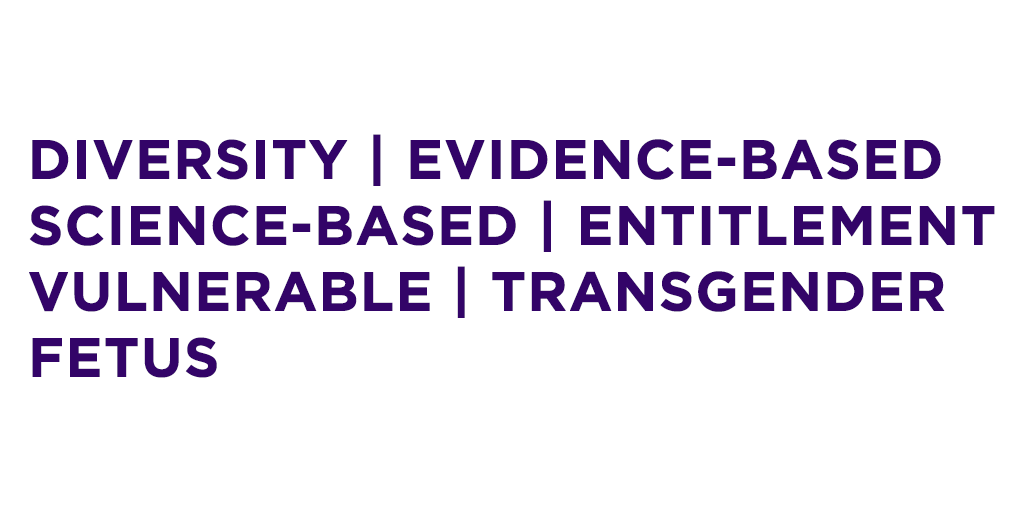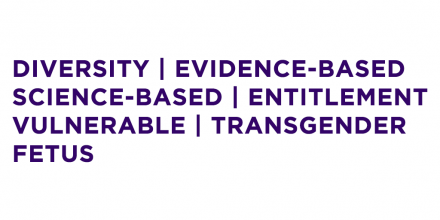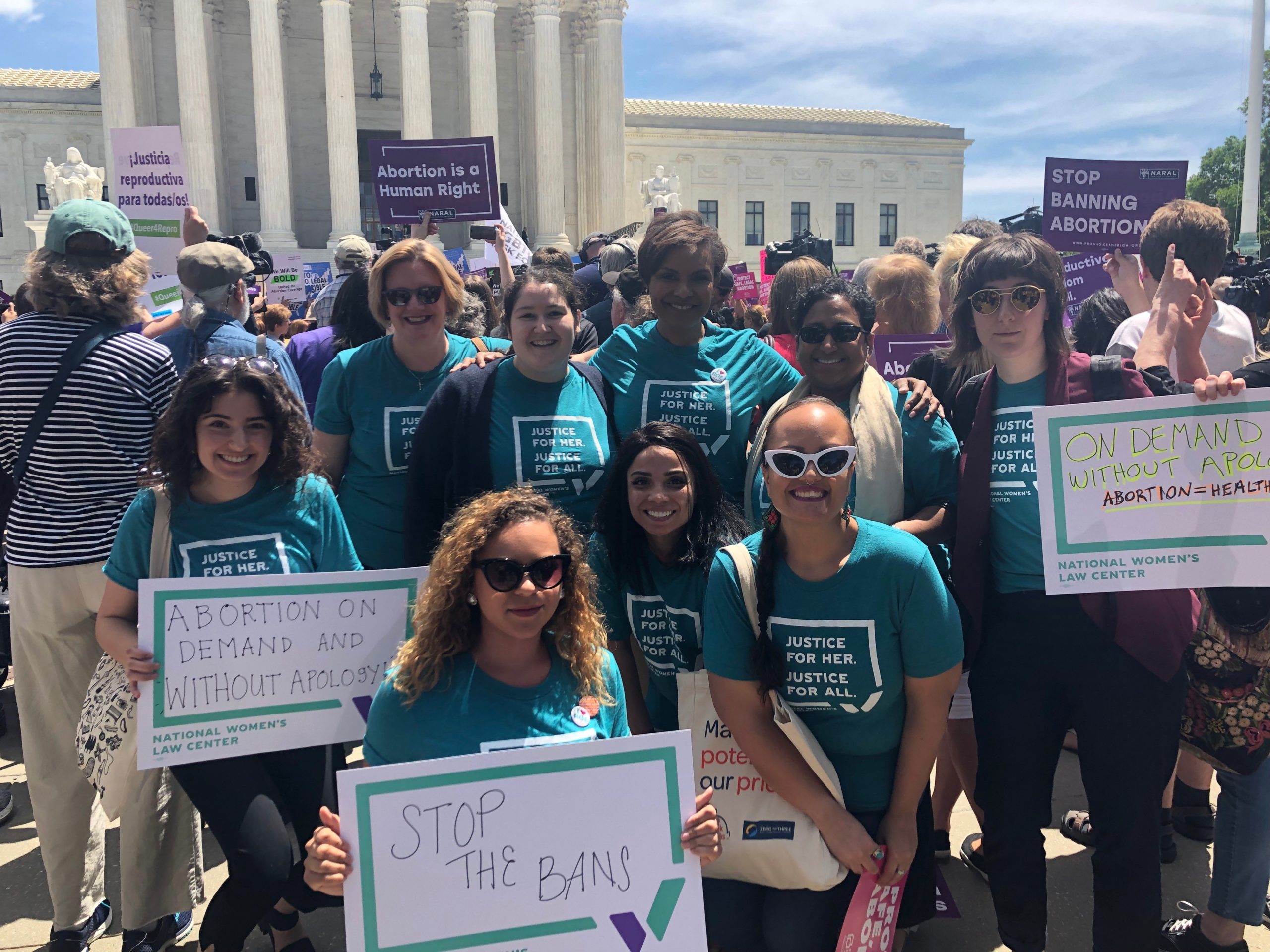Abortion rights, women of color, and LGBTQI+ people are under attack. Pledge to join us in fighting for gender justice.
Words Matter for Women’s Health

 Late last week, reports surfaced that officials at the Centers for Disease Control and Prevention (CDC) and other divisions within the Department of Health and Human Services (HHS) had been briefed by government representatives to exclude seven words from budget documents: diversity, evidence-based or science-based, entitlement, vulnerable, transgender, and fetus.
Late last week, reports surfaced that officials at the Centers for Disease Control and Prevention (CDC) and other divisions within the Department of Health and Human Services (HHS) had been briefed by government representatives to exclude seven words from budget documents: diversity, evidence-based or science-based, entitlement, vulnerable, transgender, and fetus.
While representatives from HHS and the CDC have refuted these reports—saying that they “mischaracterized” the briefing –this action is aligned with the agenda of the Trump Administration and its allies in Congress who are dedicated to a dangerously extreme ideology that erases the experiences and identities of transgender individuals, eliminates women’s ability to obtain abortion and contraception, puts health coverage out of reach for those struggling to make ends meet and other vulnerable individuals, and ignores – or contradicts – science and medical evidence.
Some report that exclusion of these terms is merely a way to push the President’s budget through a conservative Congress. But, this argument is disingenuous—the President’s Budget is an outline of his policy priorities and a guide for his allies in Congress to follow with funding consistent with those priorities.
By recommending the exclusion of these seven terms, the President is making clear that he is prioritizing a political ideology that is anti-women, anti-LGBTQ, anti-low-income communities and communities of color above the health and well-being of the nation. For example, officials were reportedly told that, in lieu of using the terms “evidence-based or science-based,” they can use the alternative language: “CDC bases its recommendations on science in consideration with community standards and wishes.” Of course – in this Administration’s view – “community standards and wishes” would be the standards and wishes of a community with extremist views that seeks to disregard legal and medical precedent to eliminate rights and access to care that is vital for millions. This includes millions of women nationwide.
Indeed, the seven words that are the focus of media reports matter significantly for women’s health:
(1). Diversity: Different women have different experiences of the health system, which impacts their health outcomes, including access to affordable health care, experiences of discrimination within the health system, and access to linguistically and culturally competent care. For example, black women are 3 to 4 times more likely to die from pregnancy-related complications than white women, and twice as likely to suffer from severe maternal morbidity. And the cervical cancer rate among Vietnamese American women is five times higher than that of white women, and the highest rate of any racial or ethnic subgroup. This means that different medical interventions and research are required to address these alarming disparities. But by refusing to acknowledge “diversity,” the Trump Administration is setting the stage for these disparities to go unaddressed in research and medical interventions developed by our nation’s health care agency. Diversity matters for women’s health.
(2). Evidence-based or (3) Science-Based: The Trump Administration has flouted science and medical evidence when it comes to women’s health. For example, the Trump Administration’s recent rules to take birth control coverage away from women were based on junk science and driven by ideology, in direct contrast to medical evidence of the importance of birth control as a key component of women’s preventive health and the recommendation for coverage by a panel of women’s health experts. Refusing to say evidence-based and science-based signals that it is politics – not medical expertise – that will drive this Administration’s decisions.Evidence and science matter for women’s health.
(4). Entitlement: It’s no surprise to hear reports that the Trump Administration is seeking to bar use of the word “entitlement” since it is attacking an entitlement program that is a significant source of women’s health coverage and jobs—Medicaid. In fact, women comprise the majority of adult Medicaid enrollees –the program covers 33 million women and girls nationwide—and the program supports nearly 4.4. million health sector jobs held by women. Yet, the Administration has sought to dismantle Medicaid, a vital source of women’s health care, including family planning services and preventive care, through attempts to convert the program into a block grant or per capita cap system and impose punitive work requirements. These proposals would devastate access to care and the economic security of women covered by Medicaid. Refusing to use the word “entitlement” fuels these attacks on core programs like Medicaid. Entitlement programs like Medicaid matter for women’s health.
(5). Vulnerable: Vulnerable communities include those struggling to make ends meet, those susceptible to illness, and those with pre-existing health conditions. Before passage of the ACA, women were routinely denied coverage simply for conditions that were unique to women, like prior pregnancies. But, the ACA prohibited such discriminatory insurance practices, opening the door to women’s unprecedented access to insurance coverage. And historically the CDC and HHS have played critical roles in ensuring that individuals “vulnerable” to HIV and AIDS had access to supports, information, and resources. We cannot ignore the experiences of individuals who may be vulnerable to illness, and in fact, recognizing and designing interventions to help those who are vulnerable is vital for improving health outcomes. Exclusion of the term “vulnerable” is an attempt to erase the needs and experiences of vulnerable individuals. Recognizing vulnerable communities matters for women’s health.
(6). Transgender: Approximately seventy percent of transgender and gender non-conforming individuals reported being outright denied health care. The ACA prohibited such discrimination, including through sections 1557 and 1302. These protections have been vital to ensuring access to care for transgender individuals and these protections have also been a target of the Trump Administration’s extreme political agenda. Refusing to use the word “transgender” is consistent with this Administration’s attempts to erase transgender individuals. Transgender individuals’ health matters.
(7). Fetus: The Trump Administration and its allies in Congress have waged attacks on women’s reproductive health care, including abortion. This ranges from dangerous anti-abortion provisions in “must-pass” funding bills to other legislation that directly impedes a woman’s constitutional right to abortion. Recently, Republicans in Congress sought to insert the words “unborn child” into a tax bill to set up a challenge to Roe v. Wade. Abortion care is vital for women’s health and economic security—but this Administration wants to deny that reality. Refusing to use the word “fetus” not only furthers an anti-abortion agenda, but also has real consequences for public health, since the word fetus is used in educating the public about the harm of the Zika virus. The constitutional right to abortion—and the ability to use the term “fetus”—matters for women’s health.
Words matter—they matter because women experience the health system differently, have different health needs, and require different medical assistance and interventions. These experiences should not be ignored or erased and our health system should not be politicized to deny anyone the health care that they need. Such censorship obstructs the critical work of HHS and the CDC, including protecting individuals from health threats, supporting communities to fight disease, and providing health information—and millions of people will pay the price for prioritizing politics over health. Politics should never override public health.





